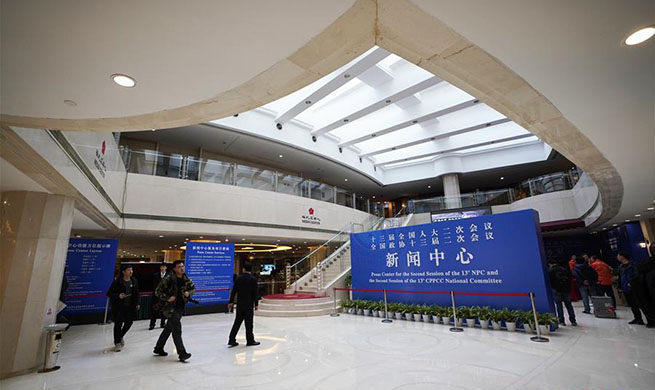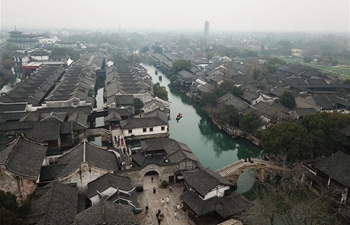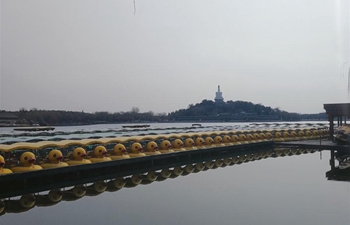ROME, Feb. 28 (Xinhua) -- Italy's immigration policy was not expected to go through major changes in 2019, and especially in the perspective of the European elections taking place across the European Union (EU) in May, according to analysts.
At the same time, researches in the sector suggested some restrictions on asylum seekers recently implemented by the government might have an impact on the Italian society overall.
"During this year and the next, any development on the migration topic will be strictly connected with the balance inside the Italian government," Matteo Villa, research fellow for the Migration Program at the Institute for International Political Studies (ISPI), told Xinhua.
"As such, in the current political context, a softening of the immigration policy is not likely."
MORE IRREGULAR MIGRANTS UNDER NEW RULES
The most significant provision introduced by the current rightwing government was the so-called "security decree", advocated by Interior Minister Matteo Salvini and approved by the cabinet in October.
It introduced several changes, including the cancellation of the humanitarian protection, one of the three levels of protection (the other two being refugee status and subsidiary protection) the country had so far offered to asylum seekers.
It also extended up to 180 days the length of time during which authorities were allowed to detain migrants in detention centers in order to check their identity.
Thirdly, the decree partially dismantled the System of Protection for Asylum Seekers and Refugees (SPRAR), a state network of reception centers in which asylum seekers were distributed across the country and assisted while waiting for their claims to be assessed.
Under the new rules, the SPRAR network was now open only to asylum seekers whose requests were accepted.
Analysts warned a first effect of this legislation could be a rise in the number of irregular migrants. "What happens when a government lowers the levels of protection for asylum seekers, especially if it is unable to increase returns of migrants to their countries of origin?" Villa wrote in a recent publication with ISPI.
"The answer is straightforward: an increase in undocumented migrants stuck in the country, and this is precisely what is probably going to happen in Italy over the next two years."
Between June 2018 and Dec. 2020, the number of irregular migrants would grow by at least 140,000 units, the ISPI analyst estimated on the base of Interior Ministry data.
"Part of this increase (about 25,000 units) has already happened over the past months, but much of it is expected to take place between today and end-2020," Villa explained.
"In a baseline scenario -- in which Italy retained its three levels of protections for refugees -- irregular migrants in Italy would rise by about 60,000 units (in the same period)," he added.
The security decree (converted in law in December) would add further 70,000 irregular people to this baseline scenario, "more than doubling the number of new irregulars in Italy."
Considering that some 530,000 irregular foreigners were estimated in the country on Jan. 1, 2018, Villa warned the total number of irregulars might reach 670,000 units by Dec. 2020.
HARDLINE STANCE REMAINS AMID EU VOTE
According to Nicola Pasini, political science professor at the University of Milan, the vote to renew the European parliament -- scheduled on May 23-26 in each member state of the EU -- would provide a further reason for Italy's governing forces to not change their stance on immigration.
"Immigration is at the core of political agendas, and it represents the topic on which elections can be won or lost today, not just in Italy but across Europe," Pasini told Xinhua. "This is why I do not expect major changes in Italy's policy in the short period."
The scholar, who coordinates a research line on Migration and the Future of Europe at the ISMU Foundation on Initiatives and Studies on Multi-ethnicity, stressed the policy on immigration was usually highly symbolic and with a strong impact on the public opinion.
"In this perspective -- and even more so with the forthcoming European vote -- keeping a hardline stance is in the interest of the governing forces, and especially of the League party."
The rightwing League party led by Salvini was a major ally in Italy's current coalition government, along with anti-establishment Five Star Movement (M5S).
Recent pollsters showed the League was now the largest party in Italy, and its traditional anti-immigrant positions appeared in line with the mood of large sections of the Italian society, Pasini noted.
"The majority of Italians seem to share the government's policies in this moment, including migration," the expert said. "Many feel hostile towards migrants because they have learnt to associate immigration with unacceptable changes in their life."
Since the global financial crisis in 2008, in fact, a long recession has haunted Italy's economy, hitting hard on the life standards of many people, and especially of the middle class.
This factor would strongly restrict any room to manoeuvre to introduce welcoming policies towards migrants and refugees in the country, "which can only be implemented if there is consensus among the public opinion," Pasini stressed.
Pasini also agreed with the ISPI analyst on the short-term effects of the restrictions recently introduced on refugee protection.
"The number of irregulars is likely to increase in the short period, and this will create further dissatisfaction (in the population)," he said.
Analysts noted the figure of 670,000 irregular migrants estimated by end-2020 was very high, but not unprecedented. "Similar figures have been reached or exceeded in 2002, 2006, and 2008," Villa wrote in his publication. "When this happened, however, the Italian governments at the time decided to proceed with mass regularizations."













